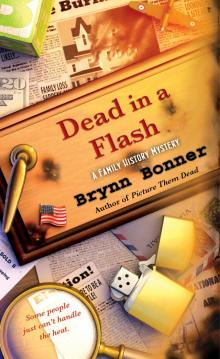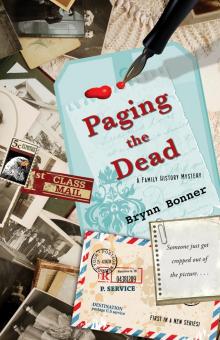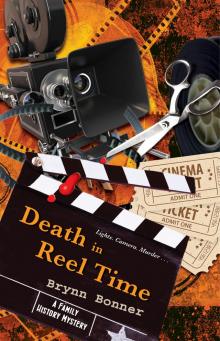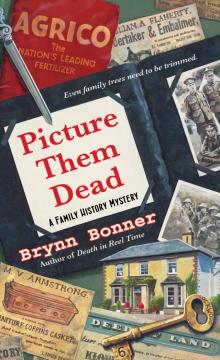- Home
- Brynn Bonner
Paging the Dead Page 19
Paging the Dead Read online
Page 19
I was happy for her. Really, I was. But the house seemed big and empty after she left. I couldn’t find a movie that held my interest. I was restless and it felt like I should be doing something, but for the life of me I couldn’t figure out what.
I wandered out to the kitchen to fix myself some supper, more for something to do than because I was hungry. I was staring at the meager contents of the fridge when the doorbell rang. It was a promising sound. Maybe Jack had decided to come by instead of calling me back. But no, he wouldn’t ring the bell—would he? We weren’t on such friendly terms right now, so maybe he would.
It wasn’t Jack; it was Ingrid and Cassidy and both of them were obviously out of sorts.
“You left this up at the house and I thought you might need it to finish up the family history.” Ingrid held out a small notebook before I’d even had a chance to say hello.
I took the notebook and looked at the cover. “No, it’s not mine,” I said.
“Oh,” Ingrid said, frowning. “I saw that list and I assumed it was yours or Esme’s.”
“List?”
“On the first page,” Ingrid said, grabbing at Cassidy’s hands as the girl flapped them back and forth against Ingrid’s hip, twisting from side to side and making whiny noises.
I opened the notebook and glanced at the page. The list read: birth certificates, handwriting samples, bank statements, letters. I handed it back to Ingrid. “I can see why you thought it was mine, but no, I’ve never seen it before and it’s not Esme’s.”
“Strange,” she said, putting the notebook back in her bag. “I just assumed . . . maybe it was Dorothy’s, though it doesn’t look like her handwriting. Oh, well, wasted trip. As you can see I need to get Cassidy home to bed. She’s had a long day and she’s tired.”
“I’m not tired,” Cassidy said. “I’m sad.”
This seemed to me a gross understatement. The poor child looked absolutely desolate.
Ingrid gave me an exhausted, pained smile then guided Cassidy along to the car.
I closed the door and leaned against it, mentally and physically exhausted. Hadn’t this turned out to be a peach of a week? My client had been murdered. I’d been the subject of horrid gossip. My wonderful little town had been turned inside out. Jack and I were on the outs. Winston was hurt. Two guys I’d come to like were suspects in Dorothy’s murder. I was starting to be suspicious of everyone who crossed my path. Esme might be slipping away from me and I was powerless to ease the suffering of a grief-stricken six-year-old.
I didn’t need food or a movie. I needed to be doing something. I went into the workroom, where I felt I had some control. The timeline of Dorothy’s last day was still bothering me.
Genealogists depend on all kinds of charts and graphs to help keep track of family lineage, historical events and cultural phenomena and to make sense of how they all intersect. Timelines are my personal favorite.
I grabbed a handful of old dot-matrix printer paper from the three boxes I hoard for just this purpose, unfolded ten sheets along the length of the worktable and reinforced the perforations with tape. I drew a line across the bottom of all ten sheets and crosshatched at intervals to represent the hours from noon until seven. I labeled this line Me & Esme. Then I repeated the process in parallel three more times, one for Jeremy, one for Hank Spencer and one for Linda Burnette.
The coroner had established Dorothy’s time of death at 5:30 p.m., give or take an hour. A pretty big fudge factor, but I guess it’s an iffier proposition than they make it out to be on the TV crime shows. I drew a box that took in that interim across all the lines.
On our line I made a red tick for the time stamped on the receipt we’d gotten from the big box store, then marked another one for the plant nursery. I moved up and made a blue tick at that point on Jeremy’s line since I knew he was still at the nursery when we checked out.
And so it went. For the next two hours I strained to remember and scribbled feverishly, ticking in every time marker I could think of based on what I’d seen or heard, putting a question mark by those that were unverified, or to put it in layman’s terms, wild guesses. I went at it like a woman possessed. I was so absorbed I didn’t even hear Esme come in until she was standing over my shoulder.
“What in heaven’s name? Sophreena, what are you doing, darlin’? We are done with this business. It is signed, sealed and about to be delivered.”
“This is something else,” I said.
“Yes, I see that,” Esme said, leaning over the table and looking closer at my complicated color-coded schematic. “Oh, Sophy-girl,” she said, then let out a long sigh.
I’d been expecting her to scold me, to yell at me to let it go. That would have gotten me riled up, given me something to fight against. But her tenderness undid me.
I burst into tears.
And this is what I love most about Esme: Though she encourages me to be strong, when I’ve reached my limit she knows. Without a word she gathered me in her arms. “Open up the waterworks,” she soothed. “Let all the bad out.”
And I did. I blubbered, I wailed, then I blubbered some more and Esme patted and crooned. A half hour later I was spent and it was all I could do to get up the stairs and climb into my bed.
nineteen
TRADITIONALLY ESME AND I SPEND THE DAY AFTER WE FINISH A job organizing the workroom and checking inventory before we begin a new project. We had two smaller jobs coming up within the next month. One was for a recent widower who, having been reminded of his mortality, was having his family line documented for his children. The other was for a large extended southern family with half a dozen amateur genealogists in its midst. They’d taken up a collection at a family reunion to have us construct a chart that resolved the conflicting family trees the amateurs had put together.
Today the state of the workroom wasn’t on my radar. I was consumed once again by the wonky timeline. I studied and muttered, marked and studied some more. I simply couldn’t make it work.
“I need to talk to Hank Spencer,” I said.
Esme, who was trying to clean around me, harrumphed, “Good luck with that. Denny says he’s lawyered up.”
“You sound like a cop.”
“Maybe I did pick up a little of the lingo last night.” She laughed. “But, Sophreena, I think he’s a good cop. He really wants to find the person who did this because he really means that protect and defend thing.”
“Good, but can he do it?” I asked. “So far it seems like they’re getting nowhere.”
“Yeah, that ring showing up means no robbery, so that opens things up for a whole new theory of the crime. And with the DNA results from that cup coming back like they did . . .”
“I know, I know,” I said. “And I keep going back to that conversation I overheard between Ingrid and Jeremy. She said, ‘They have no reason to suspect you,’ she didn’t say, You didn’t do anything wrong. Could it possibly be the two of them plotted against Dorothy? That all their grief and regret is just for show? That thought just disgusts me.”
“I agree, but let’s face facts. Jeremy had a lot of anger stored up. And Ingrid and Dorothy had issues—big issues. How many times did we hear them fighting during the last six months?”
“Tons of low-decibel fussing and a few epic throwdowns,” I allowed. “But harsh words are one thing; cold-blooded murder’s something else. And Ingrid has an airtight alibi.”
“Which only means she didn’t actually kill Dorothy,” Esme pointed out. “Doesn’t mean she wasn’t in on some plan. But let’s not go down that road, Sophreena. It’s too awful to think about.”
“If Jeremy would just nail down where he was during this little window here,” I said, rubbing my pencil eraser along his timeline, “he’d be in the clear. It’s the only time he can’t account for his whereabouts.”
Esme came over to look at the chart again. “And unfortunately it falls right into the window for Dorothy’s time of death.” She reached over and started folding up the timel
ine. “You’re obsessing, Sophreena. Now put this away. We’ve fulfilled our obligation to Dorothy.”
• • •
I decided Vivian must have been a general in another life as I watched her coordinating the operation at High Ground. The actual memorial service would begin at noon tomorrow and with Vivian at the helm I had no doubt it would start precisely on time. The caterers were doing as much as they could ahead of time and a small army of gardeners was trimming, raking and fluffing a backyard already meticulously manicured. The programs Vivian had designed were delivered and the florist’s van pulled up and began carting in a plant extravaganza, the floral arrangements to follow in the morning.
Vivian had ignored my advice to skip the bookstands, but at least she’d cut back. There were four beautiful oak pieces standing at wait in the dining room. Some carpenters must have been burning the midnight oil, too. Esme and I set books on each stand and placed the rest on the dining room table at appropriate intervals, then Esme went off to find Vivian to get her stamp of approval.
I wandered out to the kitchen where a woman was at the sink moving dishes from one side to the other. She was dressed in black slacks and a crisp white shirt and her hair was up in a chic French twist. I assumed it was the caterer but when she turned I was surprised to see it was Linda.
“Wow,” I said, “you’re all gussied up for a work day.”
“Not my idea,” Linda said, looking meaningfully out to where Vivian was barking orders at the gardeners from the porch. “I mean I would have dressed up for tomorrow, of course, but these are going to be ruined before this day is over. I have real work to do. She thinks it would show a lack of respect for Dorothy for me to come in jeans, though Dorothy never had any complaints about it.”
“Vivian’s priorities may be skewed, but it looks like she’s got things well in hand here.”
Linda nodded. “She does. Don’t mind me. Vivian’s doing a great job and I know this is just her way. It’s just hard to be back here without Dorothy.”
She threw a dishtowel onto the counter and knocked off a notebook that had been balanced on the edge. “Oh, for heaven’s sake. Again?” she grumbled, reaching down to pick it up. “I wish she’d find somewhere else to put this thing.”
I glanced at the offending book.
Linda saw my frown. “Sorry, like I said, I’m grumpy. It’s Vivian’s sketchbook. She leaves it there all the time and it’s in my way.” She rested her back against the counter, wiping her hands on a paper towel. “But I’m trying to make it clear she’s in charge for now. I don’t know if you heard but it looks like I’ll have a job, for a while at least. Dorothy donated the house to the town and she put in some kind of clause that I be kept on as manager of the place for at least a year at full-time salary. Vivian is finding that a hard pill to swallow.”
“That’s fantastic,” I said. “Listen, Linda, would you mind if I asked you a couple more questions about the day Dorothy died? I know this isn’t exactly the time or place, but I think it might be important.”
“But I’ve already told you everything I remember,” she said.
“I know,” I said, “but something is bugging me about the timing. Could you close your eyes and describe to me exactly what you did that day, let’s say from the time you first agreed to go to the store for Dorothy?”
“I’m willing, and I’m overdue for a break,” she said. “But we’ve got to get out of here to talk. Vivian will have a conniption if she thinks I’m slacking. We could go out on the patio.”
I looked to the backyard where the leaf blowers and lawn mowers were going full force. “How about we try the front porch?”
Linda nodded, and after pouring us each a glass of iced tea she led the way. We settled into a couple of wicker chairs and I gave her a couple of moments to relax.
“This may be nothing,” I said, my pen poised over a yellow legal pad, “but bear with me. Close your eyes and tell me every single detail you can think of. You never know what little thing might be important.”
I could see she thought this a complete waste of time, but she closed her eyes and began. “Dorothy was on another of her diets and wanted cottage cheese and fruit for supper. But we were out of cottage cheese and the fruit we had was sad looking. She asked if I’d mind going to the store before I went home. I told her I had some other errands to run and I could swing back by to bring her the groceries on my way home. I asked if she’d be okay eating a little later and she said that would be fine.”
“So do you have any idea what time it was when you left?”
Linda frowned. “Not really. We had this conversation quite a bit earlier in the day. I still had a few chores to do. I made up a pastry tray and put out the coffee service. I set the Mr. Coffee so all Dorothy had to do was push the button when whoever it was she was meeting with arrived.”
“And she didn’t say who this person was?”
“No. She was always having meetings in the evening about garden club or town business or whatever, so it wasn’t anything out of the ordinary for me to set up the coffee and put out pastries or snacks before I went home. It was a regular routine.”
“Okay, so you left for the store,” I prompted again, eager to speed her along before Vivian caught us loitering.
“I had a couple of other errands to do,” Linda said. “I went by the drugstore to pick up Dorothy’s prescription—”
“Did you get a receipt?” I interrupted.
“I’m sure it was stapled to the bag. I don’t even know where the prescription is now. Maybe the police took it.”
“And the receipts from the grocery store?” I asked.
“No idea. Normally I keep up with them. Dorothy keeps—kept,” she corrected, “an envelope of petty cash in the kitchen drawer that I used for little things. I’d put the receipts and the change back in the envelope after an errand and I was religious about it. But that day I hadn’t gotten around to that before I found—” She stopped talking and I saw a shudder run through her body before she went on. “And I don’t even know what happened to the groceries I bought for Ben and me. I suppose Ben did something with them. The receipt would have been in the bag.”
“I’m sorry, Linda,” I said. “I know this is hard. Let’s just back up a little. When you pulled up in the driveway there were no cars here and you didn’t notice anyone around?”
“No one. I figured her meeting must have been a short one.”
“So, you took the grocery bags from the car, and . . . ?”
“Grocery bag,” she corrected. “It was just the one bag. “I brought it into the kitchen,” she said slowly, reliving the memory. “I set it on the counter, and of course, knocked off Vivian’s sketchbook as per usual.” She shook her head and chuffed before going on. “I puttered around in the kitchen for a few minutes. I put the mugs Jeremy and Dorothy and I had used earlier into the dishwasher then peeled some fruit and—”
“The mugs you used?” I asked. “Coffee mugs?”
“Yes. When Jeremy came to pick up Cassidy, Dorothy and I were having a cup of coffee in the kitchen. Well, actually, Dorothy was having tea; I was having coffee. Jeremy had a cup while he waited for Cassidy to gather up her things.”
“And you put those cups into the dishwasher?” I asked.
“Mugs, yes,” she said, frowning.
“When you set up the coffee tray for Dorothy’s meeting, did you use mugs for that?”
“Oh, no, she always used the good dishes for her meetings. Fancy little coffee cups, you know, the useless ones? You can barely get a finger through the handle. Bone china with gold rims that have to be hand washed. I’m not a fan,” she said, wrinkling her nose.
“So, it’s not likely that Jeremy would have had yet another cup of coffee with Dorothy an hour later,” I said, thinking aloud.
“Well, no, that’s not quite right,” Linda said, frowning. “Jeremy drinks more coffee than any human being I know.”
“But surely she wouldn’t have needed a
meeting with him that night if she’d just seen him. Why wouldn’t she just cover whatever it was when he came to get Cassidy?”
“Dorothy didn’t operate off-the-cuff like that,” Linda said. “If she had an issue to discuss it got her full attention and she liked there to be some rules of order and ceremony about it. She held that people had clearer understandings about things when they were paying full attention.”
“Well, that’s true enough,” I mused. “Esme and I got that treatment while we were working for her. We’d see her daily out in the gatehouse and chat about the artifacts and she’d still call me to come up here to give weekly reports.”
“That’s how she operated,” Linda said. “I’m sorry, Sophreena, I’ve really got to get back in there. I wish I could have been more help.”
“No, this has been good,” I said, reassuringly.
In truth I was nowhere closer to solving my timeline problem, and instead of staying fixed in place every time-marker I tried to nail down kept moving like a slider on a scale, tipping the balance as it shifted one way or the other.
I was studying my notes when a voice from somewhere behind me made me jump. “You hiding from Vivian?”
I turned to see Jeremy coming around the corner of the house, his hands jammed into the pockets of his chinos.
“Not hiding,” I said. “Just staying out of the way.” I wondered if his appearance was as casual as he made out or if he’d been lurking around the corner eavesdropping on my conversation with Linda.
“Me, too,” he said, trudging up onto the porch and settling down in the chair beside me, stretching out his legs and crossing them at the ankles. “Mom insisted I take another day off work to help, but honestly Vivian seems to be running the show. I feel useless, no, worse than useless. What’s that old saying about a screen door on a submarine? I think me being here is making people uncomfortable.”

 Dead in a Flash
Dead in a Flash Paging the Dead
Paging the Dead Death in Reel Time
Death in Reel Time Picture Them Dead
Picture Them Dead